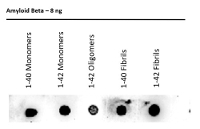1

Anti-Abeta (1-11) | Amyloid-Beta peptide 1-11 (high affinity to monomerer, oligomerer och fibrils)
AS19 4309 | Clonality: Polyclonal | Host: Rabbit | Reactivity: Human
- Product Info
-
Immunogen: Synthetic peptide chosen from human Abeta (1-11) peptide DAEFRHDSGYE Host: Rabbit
Clonality: Polyclonal Purity: Immunogen affinity purified serum in PBS pH 7.4. Format: Lyophilized Quantity: 50 µg Reconstitution: For reconstitution add 50 µl, of sterile water Storage: Store lyophilized/reconstituted at -20°C; once reconstituted make aliquots to avoid repeated freeze-thaw cycles. Please remember to spin the tubes briefly prior to opening them to avoid any losses that might occur from material adhering to the cap or sides of the tube. Tested applications: Dot blot (Dot), ELISA (ELISA) Recommended dilution: 1 : 1000 (Dot), 1:3000 (ELISA) Expected | apparent MW: 4.5 kDa - Reactivity
-
Confirmed reactivity: Human Predicted reactivity: Bovine, Chicken, Dog, Porcine, Rabbit Not reactive in: No confirmed exceptions from predicted reactivity are currently known - Application Examples
-
Application example 
All samples was prepared and handled on ice. Monomers of Amyloid-Beta 1-40 and 1-42, recombinant and synthetic peptides respectively (Alexo-Tech AB) were prepared by solubilize 1mg peptide in 50µl 20 mM NaOH followed by dilution with 1x PBS. Finally the peptides were centrifuged to discard any aggregated peptide. For oligomers, the dissolution described above was performed followed by incubation at 25°C for 2 hours with gentle agitation. The oligomer fraction was separated an collected by gel filtration. For fibrils, the dissolution described above was preformed followed by incubation in 37°C for 48h. Before use, the fibrils was sonicated for 2x 1 seconds at 21% amplitude. For all samples, 2µl was dotted on nitrocellulose membrane with the total protein amount of, 16, 8, 4, 2 and 1ng. The membranes was dried in room temperature and stored in room temperature until use. Blot was blocked with TBS + 1% dry milk + 0.3% tween-20 for 1 hour at room temperature with agitation, Blot was incubated in the primary antibody at a dilution of 1: 1 000 in blocking solution ON/4°C with agitation. The antibody solution was decanted and the blot was rinsed briefly twice, then washed once for 15 min and 3 times for 5 min in TBS-T at RT with agitation. Blot was incubated in Agrisera matching secondary antibody (anti-rabbit IgG horse radish peroxidase conjugated, AS09 602) diluted to 1:4000 in for 1h/RT with agitation. The blot was washed as above and developed for 2 min with chemiluminescent. Exposure time was 300 seconds. - Background
-
Background: Alzheimer's disease (AD) is the most prevalent neurodegenerative disease in the growing population of elderly people. A hallmark of AD is the accumulation of plaques in the brain of AD patients. The plaques predominantly consist of aggregates of amyloid-beta (Abeta), a peptide of 39-42 amino acids generated in vivo by specific, proteolytic cleavage of the amyloid precursor protein. - Protocols
- Antibody protocols
- Reviews:
-
This product doesn't have any reviews.


